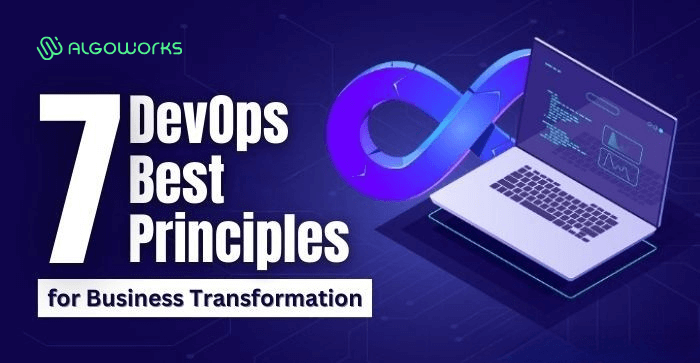7 DevOps Best Principles Crucial For Business Transformation

DevOps is an approach to software development that integrates the three key elements of development, quality control, and operations. End-to-end accountability, cross-functional components, and collaboration are made possible by this logical extension of Agile methodology. DevOps best principles include closer cooperation, improved communication standards, easier integration, and automation of repetitive tasks to end the “ping-pong” between development with operations departments.
The ultimate organizational goals can be accomplished by a meticulous understanding of the best DevOps principles.
Reasons Firms Are Adopting DevOps More Frequently
For a beginner tech enthusiast, one common activity might be finding an answer to what is a principle of DevOps. But, before delving deep into understanding the main principles, it is crucial to understand the key DevOps concepts. Let’s analyze the three components that comprise the main DevOps concepts.

A) Automation: This is necessary at every stage since the software design cycle is filled with mundane, repetitive chores. Making your organization DevOps-rich begins with this. The principles aid in keeping everything tracked and reported by establishing a more effective workflow. As a consequence of the reduction in manual activities, teams may devote more time to vital work.
B) Tools: Since automation and improved collaboration are central to the DevOps culture, they play a crucial role in this strategy. Your DevOps service provider will select the best set of technologies for your firm based on team acceptance, project goals, and pricing.
C) Culture: As was already established, implementing DevOps principles results in quicker delivery, better communication, improved scalability, process automation, and a more favorable atmosphere for technological stability. Thus, the life cycle of software development is streamlined at every level as a result of the DevOps culture.
7 DevOps Best Principles That Every Business Must Adopt
There is a difference between principles and techniques. Best practices are universal ideals that may be used wherever. Consider these more of these general, commonly accepted quality guidelines that may be applied in any firm. In contrast, principles are more concentrated on a certain product or aim. The concepts apply to the DevOps technique in this case.
1. Manufacturing Readiness
This is one of the major 7 principles of DevOps. The primary premise underlying Continuous Delivery (CD) and rapid code release is to provide production-ready updates on demand. Adhering to the principles of operational readiness results in an application code that is always ready for production. Production readiness doesn’t always imply that the application must be deployed to production regularly, but rather the ability to keep the code whenever it is required.
Continuous delivery or testing and deployment of code can provide several benefits. For starters, it reduces the possibility of downtime and serious issues. Second, it enables enterprises to deliver high-quality features, assuring quicker time-to-market and lowering the constant costs associated with the deployment process.
Also Read: The Future of Salesforce DevOps
2. Pipeline
One of the DevOps best principles describes how implementation creates a recurring system – loops that allow for development continuity. As a result, DevOps creates pipelines that include stages that code must pass through before it is pushed to production.
A standard DevOps pipeline includes the following stages:
a) Develop – Developers write code during this stage.
b) Build – The code is then built into an error-checking version.
c) Test – Following the build process, the operations team tests the code to ensure that it works as expected.
d) Deployment– The code is made available to the end user when it has passed the development and testing stages.
DevOps teams use important tactics to ensure that code flows continuously through the pipeline.
3. End-to-end accountability
In the standard Software Development lifecycle, the development and operation teams functioned through diverse roles and responsibilities (SDLC). However, one of the core ideas of DevOps best principles is to treat collaboration as a singular body that is accountable for the program from start to finish. In the traditional method, developers write the code and the operations team installs it, resulting in production inefficiencies and performance issues.
Both groups were responsible for guaranteeing product quality and fulfilling deadlines in a DevOps environment. It is vital to remember that building this sort of open and collaborative workplace necessitates producing software solutions that meet the needs of the client, stakeholders, as well as development teams, must be on the same page.
4. Customers First
DevOps demands companies to think like lean startups, investing in technologies and resources that provide better outcomes, attracting more delighted customers, and constantly reacting to market changes. Teams governing DevOps best principles must always endeavor to fulfill the demands of ever-changing customers. To ensure that performance objectives are reached, data collected from various process automation must be examined regularly.
5. Comprehensive Automation Coverage
One of the principles is to automate as much of the process of software development as possible. Automation has thus emerged as one of DevOps’ core tenets. By automating the overall software development process, the workforce can concentrate only on developing code as well as bringing new upgrades and features to the market. In the DevOps environment, anything laborious, repetitive, and automatable must be automated.
6. Accept and Learn From Failure
Incorporating DevOps techniques necessitates a shift in brand attitude regarding failure. Accepting failure fosters a learning atmosphere that has a beneficial influence on your organization’s culture.
Accepting DevOps failure also assists you in identifying methods to improve the software delivery process and product in terms of dependability, performance, and security.
One of the efficient core DevOps principles approaches does not imply waiting for software to be perfect before deploying it. Rather, it means releasing new code frequently and monitoring it to acquire insights for improvement.
7. Management of Declarative Configuration
Declarative management entails creating configuration files that specify how a software environment must appear or how a process should function. After that, you use technologies like the Infrastructure With Code platform to execute such configurations. This method is opposed to traditional imperative configuration, in which engineers actively configure programs to achieve the desired state.
DevOps best principles have fundamentally impacted the way firms produce and distribute software. While not the be-all and end-all of app design, the method has encouraged a cultural shift in the development process. To help your organization enjoy cutting-edge DevOps technology, connect with Algoworks. We have been offering similar services for a prolonged time now and would be of ideal help.
About us: Algoworks is a B2B IT firm providing end-to-end product development services. Operating chiefly from its California office, Algoworks is a leading DevOps consulting company which enables continuous delivery pipeline across the cloud platforms for faster time-to-market at reduced costs. The company’s key Salesforce Services include: Amazon Web Services, Google App Engine Services, Windows Azure, CI/CD Automation and Serverless Computing . For more information, contact us here.

